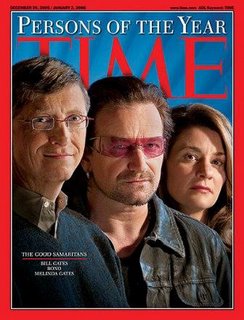Bob Buford's Reflections on Bono and Gates
 So what, I asked myself, could I learn from these "Persons of the Year" -- these philanthropic "super heroes"? We ordinary mortals, after all, certainly cannot imitate them in terms of either their wealth or fame, but they teach a great deal. Here are the lessons I see:
So what, I asked myself, could I learn from these "Persons of the Year" -- these philanthropic "super heroes"? We ordinary mortals, after all, certainly cannot imitate them in terms of either their wealth or fame, but they teach a great deal. Here are the lessons I see:1. Recognize the Gift - Accept the Gift - Execute the Gift. That's the manifesto that sculptor James Surls wrote on my whiteboard and which I described in my last "muse-letter." James has a remarkable ability to make art. He is also an encourager to many young up-and-coming artists. I've been with him walking around an art colony near Snowmass, Colorado. He's a pied piper. So is Bono, who has used his influence for good to encourage the G8 countries to forgive poor nations some $40 billion in largely uncollectible. Rick Warren is doing much the same. His last e-mail to me came from Rwanda. He was on his way to Davos to encourage corporate titans to help those in poverty-stricken, war-torn African nations.
2. Personal Engagement - Time noted that Bill and Melinda Gates each spend fifteen hours a week in their philanthropic activities. Bill's father is involved in a virtually fulltime leadership role. The whole family is hands-on staff. They travel. They see. They imagine what might be, just as Gates did when he imagined Microsoft. It's up close and personal, not distant and dispassionate.
3. Focus on Results - Not just on the process. The objective is not to feel good personally and to relieve guilt by giving away money. Bill and Melinda Gates want to use their vision, compassion, and entrepreneurial ability to solve a problem, to achieve a highly specific outcome. I have observed that people with excess capacity tend to ask one of two questions when someone is across the desk asking for their money:
Question #1: What's the least I can give this person and still feel OK in the morning?
Question #2: How much will it take to accomplish the outcome we're after?
Both the Gateses and Bono take a result-focused approach. The Time article noted that, when considering a proposal to put computers in libraries, the Gateses asked, "Why not do them all?" Bono was not working the rich country leaders to reduce the debt burden on Third World Countries. He wanted to wipe the slate clean to give them a fresh start in life.
4. Do It Now - There's an old expression I've heard several times recently. "I want to be givin' while I'm livin' so I'm knowin' where it's goin'." That's my approach and it seems to be that of the Gateses as well. Do it now and do it yourself. Don't dump it in the laps of the next generation. Jim Collins describes in his brilliant monograph, Good to Great and the Social Sector, what he calls the Hedgehog Concept. He describes it this way: "to attain piercing clarity about how to produce the best long term results and then to say 'no thank you' to opportunities that fail the Hedgehog test." He describes the Hedgehog test as expressing a deep understanding of three intersecting circles:
Passion is difficult to hire or to pass on to someone else years from now in a legal document setting up an "in perpetuity" foundation. Passion is personal. Passion is for now. Passion lapses if not put to work in a cause that ignites deep emotional engagement. The foundation I set up when I sold my company will be spent down in the next seven years to finance my passion. Peter Drucker was passionate about preserving our civilization through the medium of management. He told me once that the work he did to extend his legacy of ideas to the nonprofit world through The Drucker Foundation had added ten years to his life. Passion kept him alive!
5. The Parallel Career - Similar to "do it now," most all the people I see living for significance in their Life II Second Half period begin to allocate part of themselves much earlier in life. Bono is responsible to his band and his concert schedule, but everywhere he goes, he uses his celebrity and charisma to persuade presidents to help the world's poor about whom he cares deeply. Bill Gates still leads Microsoft. Rick Warren still leads Saddleback Church. All of them have vigorous careers as Social Entrepreneurs alongside their "day jobs." If they can, so can the rest of us.
I know. I know. You're not a rock star. You haven't sold millions of books. You can't make art. But you and I can learn a lot from these world beaters . a lot that can be applied to the up-close and personal situations that light us up. Give these questions some thought and let me know what you think, or better still, "Just do it!"
So What About You?
What are you deeply passionate about? Have you lost the passion in your life?
What is your gift? What if you were to recognize your gift? Accept your gift? Execute your gift? What could come of that?
What needs doing now that you are good at doing?


1 Comments:
Hi Eric:
Good points in terms of what each of us can do. Here's what I took away from the same set of articles.
Ram
Post a Comment
<< Home